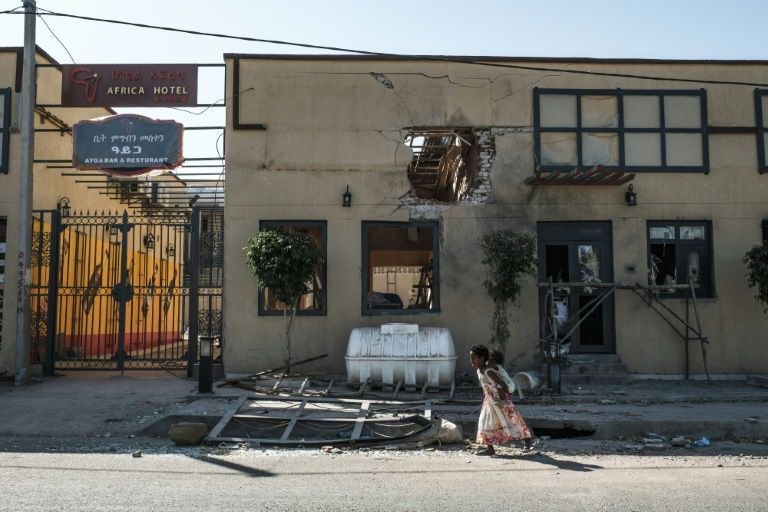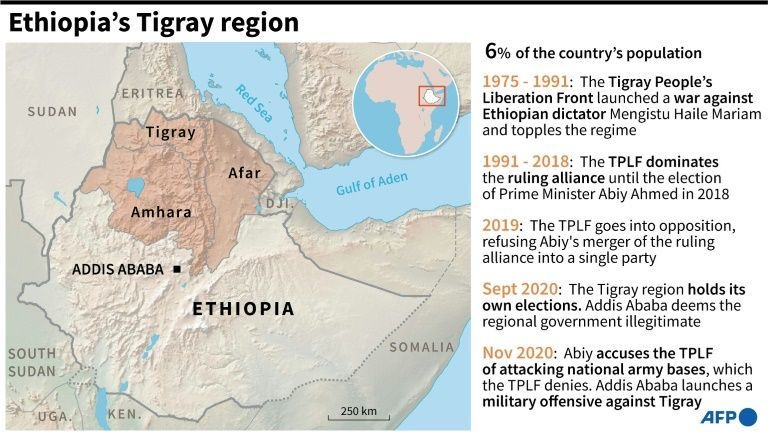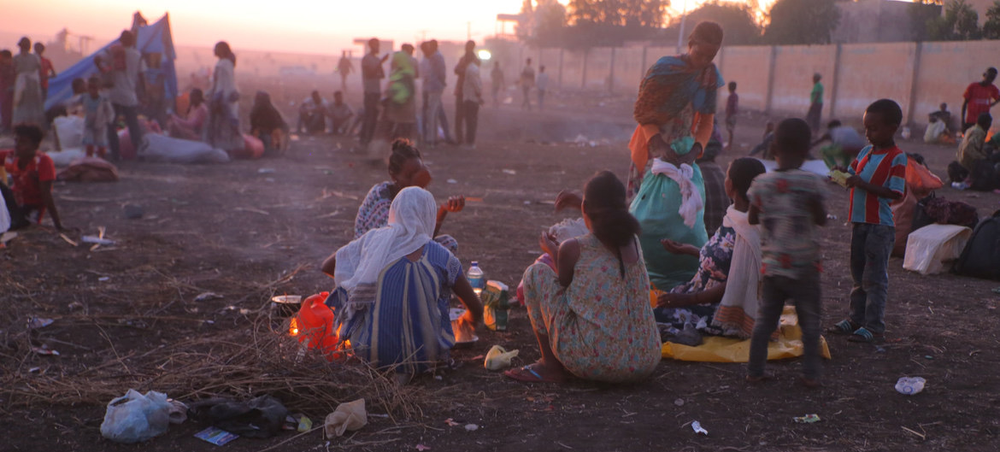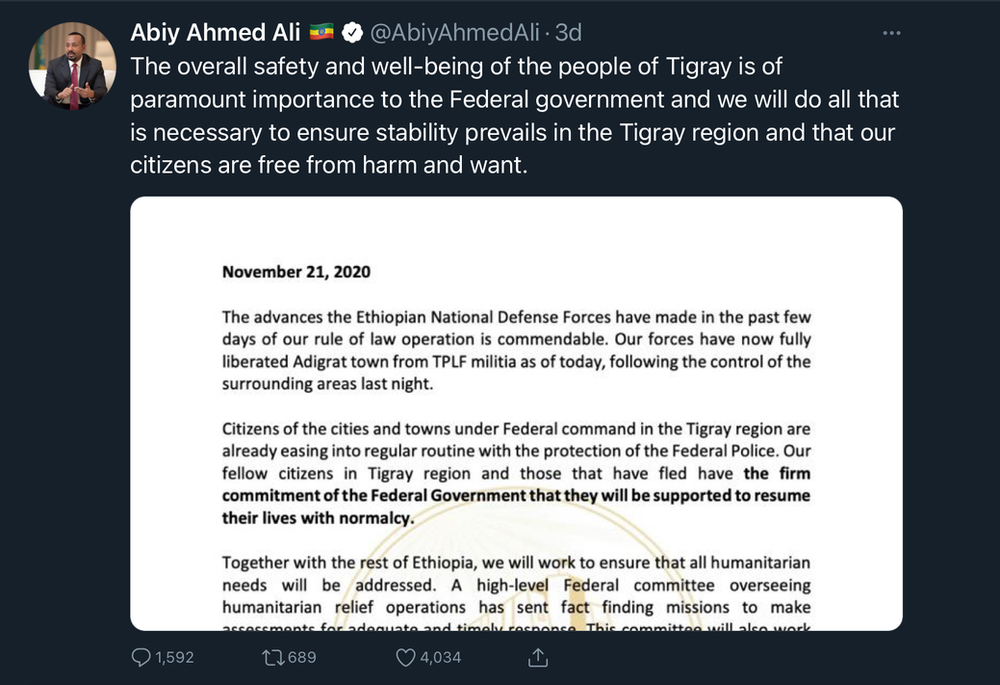Escalating violence in Ethiopia has led to the deaths of hundreds, possibly thousands, and driven nearly 40,000 refugees into neighboring Sudan. The East African nation, once a beacon of hope where its leader was praised internationally for his reform agenda and forging peace with neighboring Eritrea, now faces the implications of a bloody internal war.
This month, brewing tensions between Prime Minister Abiy Ahmed’s government in Addis Ababa and leaders from the country’s northern Tigray region spilled out into the open. In early November, the federal government accused the Tigray People’s Liberation Front (TPLF), the governing political party of the Tigray region, of ambushing a federal military base in a deadly attack. The Ethiopian government declared this as the “last red line” that had been crossed after months of alleged provocations. In a televised broadcast days later, Abiy announced that the Ethiopian military had bombed Tigray, destroying weapons near the regional capital of Mekele. In the midst of clashes between the national military and Tigrayan forces, Amnesty International has recorded evidence of an alleged massacre of civilians that left hundreds dead.

Photo: Tigray town of Humera after an Ethiopian army assault (Yahoo! News)
Abiy Ahmed’s move against TPLF sent shockwaves through the Horn of Africa region and into the international community. The United Nations human rights office has warned that “there is a risk this situation will spiral totally out of control.” Civilians fleeing the fighting have described terrifying scenes of mass violence. On Nov. 19, 17 U.S. senators sent a letter to Secretary of State Mike Pompeo asking him to “engage directly” with Abiy and “continue pressing all parties to agree to an immediate cease-fire, the de-escalation of tensions, protection of civilians, humanitarian access, and respect for international humanitarian law.” Foreign countries have also been pushing Abiy to pursue peace talks, including officials in neighboring countries Kenya and Uganda who continue to call for dialogue to resolve the conflict. But Ethiopia resisted international pressure for mediation viewing the leaders of TPLF as criminals on the run. “We are saying ‘Give us time’. It’s not going to trade until eternity…it will be a short-lived operation,” Redwan Hussein, spokesman for the government’s Tigray crisis task force, told reporters.
Tensions between Abiy and the leaders of TPLF have long been brewing. TPLF dominated Ethiopia’s military and governing coalition before Abiy took office in 2018 and announced sweeping political reforms that won him the Nobel Peace Prize last year. However, those reforms created space for ethnic and other grievances. The TPLF left the coalition last year, feeling marginalized by changes in power. Elections were scheduled to take place this year but were delayed due to the COVID-19 pandemic, extending Prime Minister Abiy Ahmed’s stay in office. In objection the Tigrayan officials held elections anyway. Abiy refused to recognize the results from September and the federal government moved to divert funding funding for Tigray to local administrations instead of the regional government, further aggravating TPLF.

(Image Source: Yahoo! News)
Tigray’s leader Debretsion Gebremichael warned of a bloody conflict, accusing Ethiopian and Eritrean leaders of making “all necessary preparations to start war” against the region. Eritrea denied the accusation of sending tanks and soldiers over the border against Tigray. Tigrayan forces fired rockets into Eritrea that hit the capital Asmara on Nov 14. Debretsion urged the United Nations and African Union to condemn Ethiopia’s federal troops, accusing them of using high-tech weaponry including drones in attacks he said destroyed a dam and a sugar factory. “Abiy Ahmed is waging this war on the people of Tigray and is responsible for the purposeful infliction of human suffering,” he said. The government has denied targeting the dam or civilian locations.
However, in any armed conflict, civilians are almost sure to be victims of the violence that infiltrates their communities. The escalation of hostilities has initiated a mass exodus from parts of the region. Abiy wrote on social media that the Ethiopian government is prepared “to receive and reintegrate our fellow Ethiopians fleeing to neighboring countries,” vowing to protect their property and guarantee their peace upon return. But if the conflict escalates further, it could destabilize the region and lead to mass displacement, according to Payton Knopf, a senior adviser at the U.S. Institute of Peace. In a worst-case scenario, Ethiopia could experience “what could be one of the largest refugee exoduses we’ve ever seen,” Knopf said.

Photo: Ethiopian refugees rest and cook meals near UNHCR’s Hamdayet reception centre after crossing into Sudan (UNHCR/Hazim Elhag)
Babar Baloch, a spokesman for the U.N. High Commissioner for Refugees (UNHCR), said the agency views the situation as a full-scale humanitarian crisis. “Women, men and children have been crossing the border at the rate of 4,000 per day since 10 November, rapidly overwhelming the humanitarian response capacity at the ground,” Baloch said. In Tigray, lack of electricity, telecommunications, fuel and cash, continue to severely hinder any humanitarian response. The UNHCR has issued an emergency fundraising appeal through which people can help provide urgent, lifesaving assistance to refugees.
The ongoing conflict is also a major concern for the Eritrean refugee population of nearly 100,000 in Tigray who rely on assistance from UNHCR and partners. “The current situation is heightening the needs and the vulnerability of local people”, said Mark Lowcock, UN relief chief. “It is disrupting the work of UN and other humanitarian organizations. I call for full access to reach people in need wherever they are; safe passage for civilians seeking assistance; and the security of aid workers. Humanitarian workers must be able to deliver assistance without fear of attack.”

On Sunday, Abiy called on Tigrayan forces “to surrender peacefully within 72 hours, recognizing that you are at the point of no return, signaling to the possible end of the conflict. In a statement released by Abiy on Twitter, he promised the people of Mekelle that the government would take “ultimate care and all precautionary measures to protect the people and city of Mekelle in successfully carrying out our rule of law mission to its conclusion.” At the same time, the government is warning the residents of the besieged capital, with a population of about 500,000, that anything can happen. The government is urging Mekelle residents to separate themselves from TPLF leaders in time, but Tigray’s leader Debretsion has said his people are “ready to die” defending their homeland rejecting Abiy’s ultimatum, leaving an uncertain ending hanging in the balance.
To stay up to date on the unfolding crisis and find ways to help, Amplify Africa has identified a ,resource page with information. To donate to the refugee crisis, click ,here.
Powered by WPeMatico


